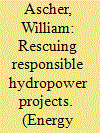| Srl | Item |
| 1 |
ID:
128442


|
|
|
|
|
| Publication |
2014.
|
| Summary/Abstract |
As regards the dual goals of additionality and sustainability, some clean development mechanism (CDM) projects were successfully registered while some were rejected by the Executive Board (EB). This paper focuses on two final statuses of these projects and aims to explore the potential determinants of CDM activities. Based on the Chinese samples of the rejections and registrations, we find that (1) according to the financial barrier analysis with the internal rate of return without CDM, the additionality is the most important and robust rule of CDM activities and the CDM projects successfully registered are more additional than the rejected ones in China; (2) the sustainability is another important determinant of CDM activities in China and Chinese CDM activities are sustainable in terms of size, while the EB is criticized for its selection of unsustainable CDM projects in terms of cost-effectiveness on emission reductions within a long period or in terms of hydropower plants; (3) some other factors including the prices of sale electricity and certified emission reductions, the generating capacity and installed capacity all tend to pose significant impacts on the final status of each project that features the CDM activities in local areas of China.
|
|
|
|
|
|
|
|
|
|
|
|
|
|
|
|
| 2 |
ID:
177429


|
|
|
|
|
| Summary/Abstract |
Given the still-growing use of coal and natural gas in generating electricity in many developing countries, it is necessary to put far more effort into promoting responsible large-scale hydropower projects. In contrast to hydro, solar and wind power face physical constraints that greatly limit their potential to replace fossil-fuel sources of power generation. Because designing hydro projects to reduce their socio-economic and environmental damage typically entails greater costs and/or lower capacity, subsidies are needed to increase the number of responsible, economically viable projects. Despite the past abuses, hydro offers low-carbon energy generation, low-cost power generation, and important potential for energy storage and peaking supply to supplement intermittent low-carbon sources such as wind and solar. The promotion of responsible hydropower requires greater awareness of the possibilities for responsible projects, greater overall climate funding, better provision for local participation and compensation, changes in the doctrines of additionality, and stronger institutions to identify, design, and broker these projects.
|
|
|
|
|
|
|
|
|
|
|
|
|
|
|
|